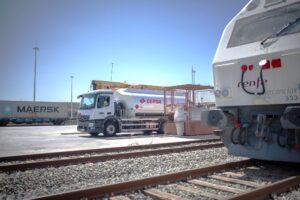Cepsa, Maersk and Renfe complete first 100 Spanish rail journeys with HVO

For 15 weeks, Renfe’s locomotives used more than 130 tons of HVO (renewable diesel) to complete 100 journeys between Algeciras and Cordoba.
This, together with the use of renewable energy along the rest of the route, made it possible to sustainably transport more than 4,700 containers (TEU) and avoid the emission of nearly 500 tons of CO2.
This pilot has obtained very satisfactory results, demonstrating optimum engine performance.
As a result Cepsa, Maersk, and Renfe are analysing the possibility of continuing to cover this route with renewable diesel and even extending it to other non-electrified routes.
This second-generation biofuel, which replaced the conventional diesel used in Renfe’s locomotives, was produced at Cepsa’s La Rábida Energy Park (Huelva) from used cooking oils.
This type of renewable fuel can be used in engines without the need for engine modifications, and during its entire life cycle (from production to use), it reduces CO2emissions by up to 90% compared to traditional fuels.
In addition, second-generation biofuels promote the circular economy by using waste for their production that would otherwise be discarded or end up in landfills.
After successfully running various tests in air and maritime transport and starting to sell renewable diesel at its service stations and customer facilities, this pilot initiative represents another step forward for Cepsa, which is working to decarbonize heavy transport through the production of green molecules.
As established in its Positive Motion strategy, the company aims to become a benchmark in the energy transition and to lead renewable fuel production in Spain and Portugal by 2030, with an annual production capacity of 2.5 million tonnes.













